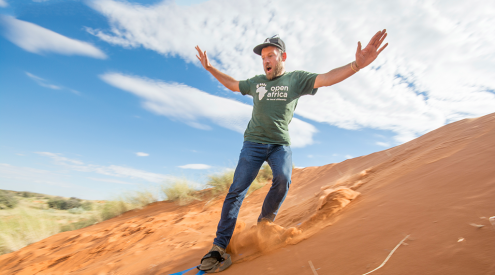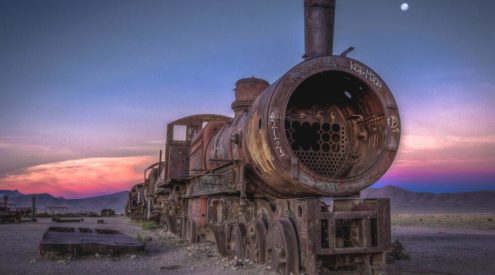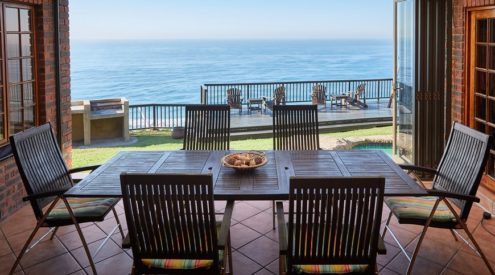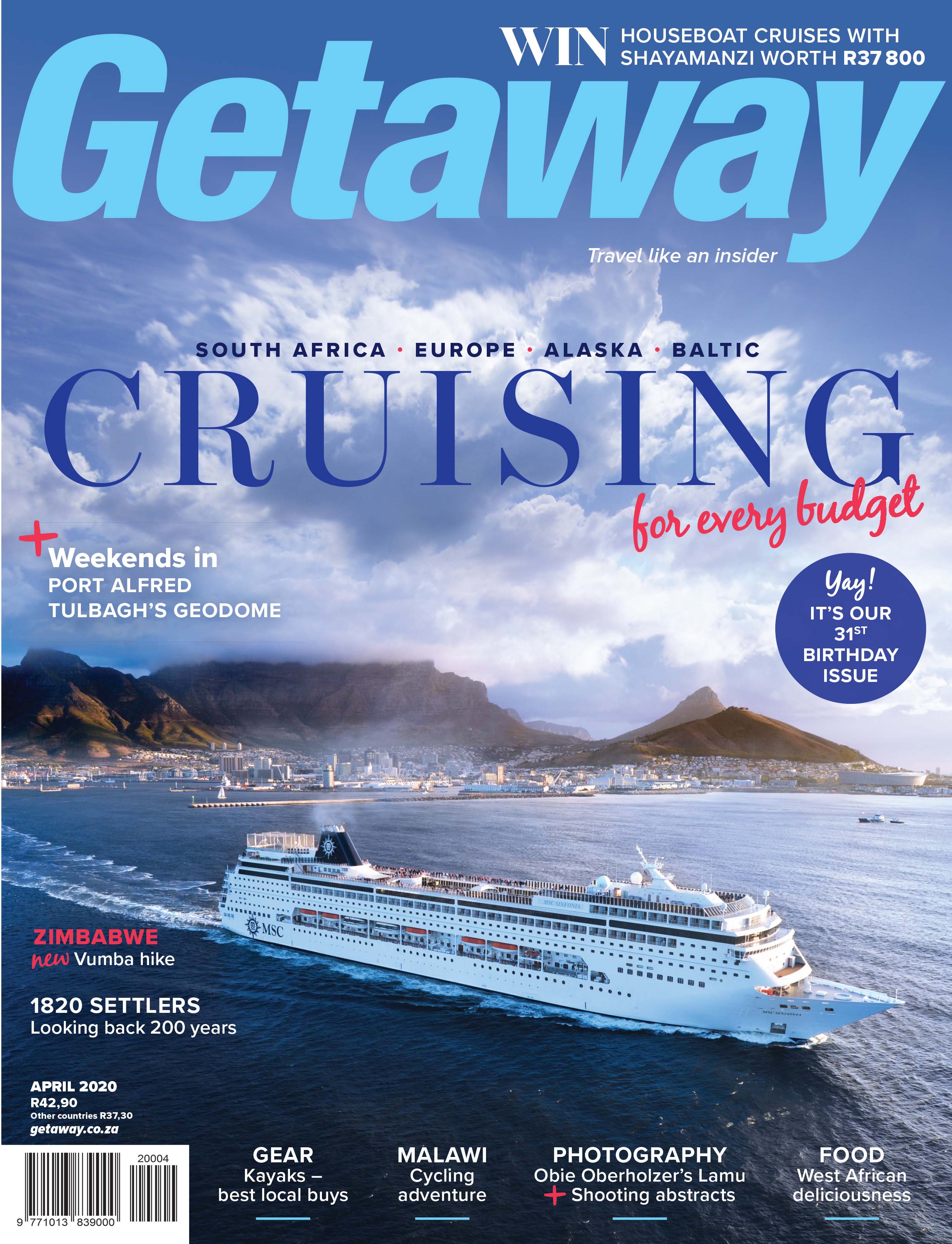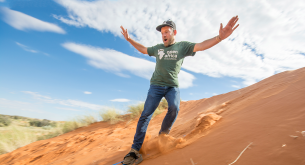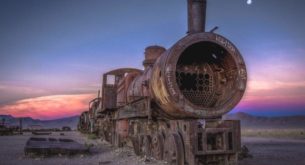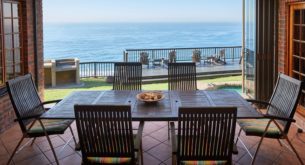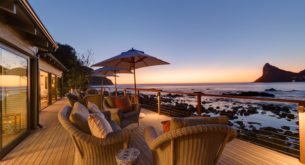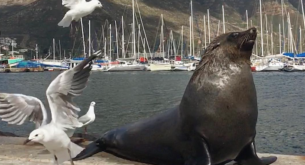There are currents of change swirling through this multicultural, balmy city. With urban regeneration projects everywhere, and Durbanite entrepreneurs taking the front seat on how they want their city to look, there’s an exciting swell of shared spaces and new faces. I visited my old home town to see how it’s changed. Here’s why you should too.
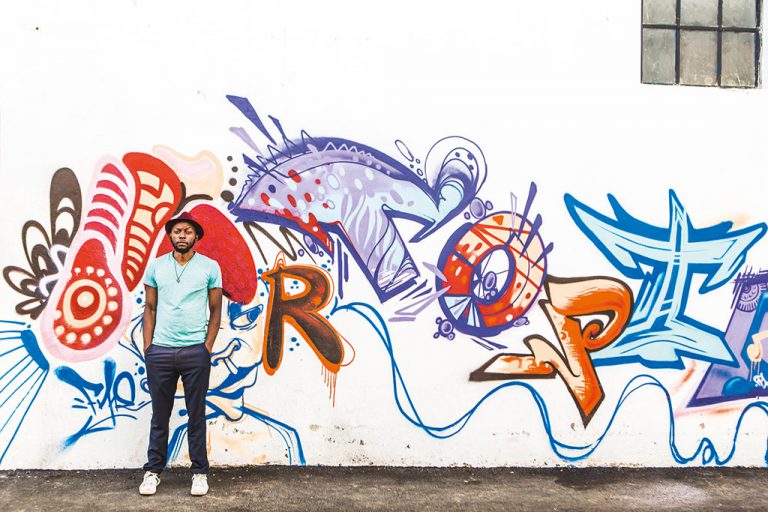
Brandpreneur Matimba Ngwenya outside 8MS’ ever-changing graffiti walls.
I’m standing on the fourth floor of Ambassador House, looking out at the city of Durban spread before me. Taxis brush paths with the perpendicular lines of shadows, attached to the feet of people scurrying about their day. Reece Easthorpe, the community manager from Propertuity, looks out with a visionary glint in his eye.
‘Everything the light touches is our kingdom,’ he says.
Okay, he didn’t actually say that, but that’s what the scene feels like as we breathe in the view. 8 Morrison Street is the initiative of Propertuity, the brainchild behind the vibey Maboneng Precinct in Johannesburg. Turning its attention to Durban, the company bought out four-and-a-half city blocks in
a rough triangle shape, stretching from 8 Morrison Street to the International Convention Centre to Ambassador House.
It’s called Rivertown Triangle. The vision is to have a walking precinct just outside the heart of Durban, to get people back into the city space and to build a truly mixed-use living environment within the community.
‘With apartheid, everyone was kept separate,’ Reece says (for real, this time). ‘We want to create a shared space again, a place where people can interact together on common ground.’
The vision is good, but it’s not theirs alone. On a much smaller scale, Station Drive Precinct is becoming the trend spot of Durban city, with creative businesses sharing the warehouse-like space. Craft beers and coffee, leatherwork, markets and music are all available during the week, but the businesses come alive on the first Thursday of the month, and every Sunday for the popular The Morning Trade market. As opposed to the capital-down investment of Morrison Street, Station Drive is a business-up approach, driven by heavily invested individuals creating their own change in the city.
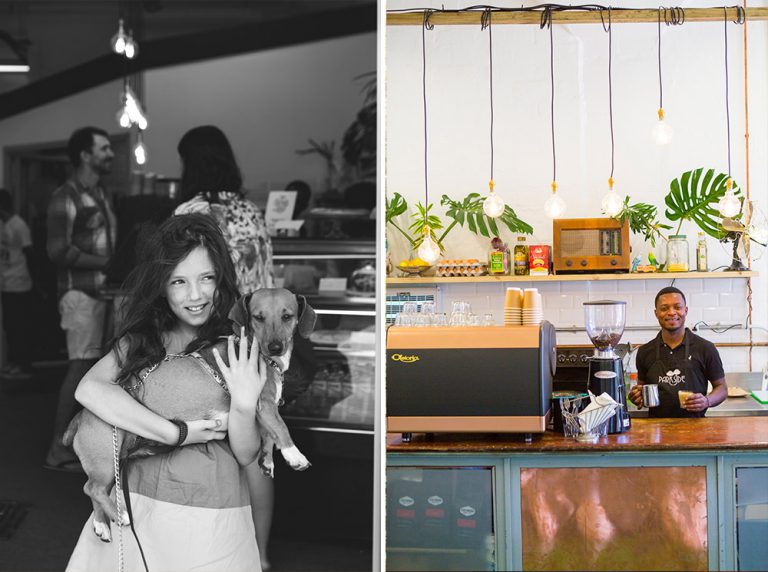
Morning Trade is a perfect spot for some relaxed early-morning coffee and browsing.
The space is good, but it’s not the first. Durban has a shared space already, an area where people of all creeds laugh and buy and enjoy together. It’s the beachfront promenade, and it’s where you will find everyone.
After picking up bicycles from The Bike & Bean, my partner and I cycle towards the harbour, past the beige beaches with fishermen dotted sparsely along piers, past the stadium, where people walk and cycle and drink early-morning coffee, past the skatepark painted with colourful graffiti, past North Beach with its landmark Wimpy. We see joggers, surfers, exercise sessions, Shembe church members offering up prayer and dogs of all sizes on leads attached to owners of all shades. There’s a mannequin dressed in traditional furs and a vendor selling pineapple slices dipped in spices.
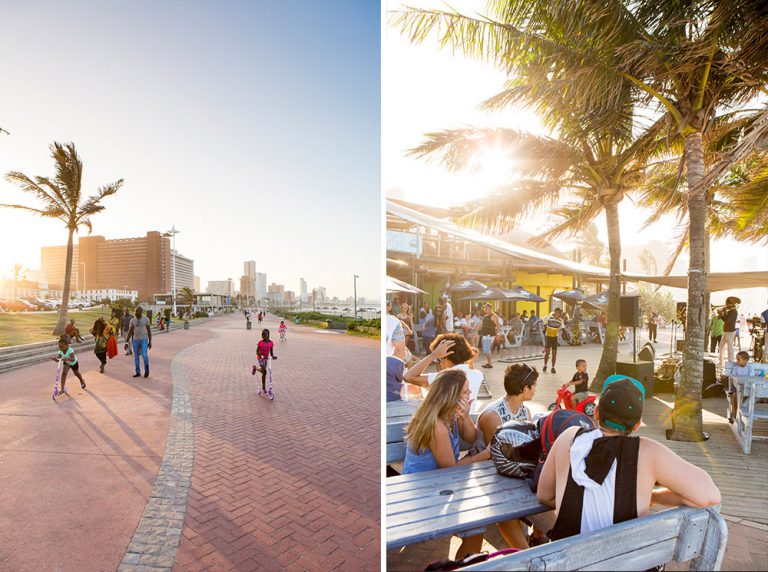
On the left, sunset is the perfect time to take a stroll along the promenade; on the right, reggae music at Wahooz Cafe is enjoyed by all.
We make our way to Wahooz for sundowners. It’s a Sunday tradition, drinking cocktails and listening to Durban reggae band The Meditators. Everyone is singing along to Bob Marley and the last of the day’s light is catching the swaying palms above the unmarked dance floor. I spot a man clad all in white, with a turban wrapped around his head and wearing reflective aviator glasses. Intrigued, I make my way over.
His name is Yira, and he’s a Rastafarian living up the North Coast.
‘This man changed my life,’ says Wayne, the man next to him. ‘He bought a Land Rover from me. Before I met him, I used to take things to heart – I got angry at every small thing.’ Yira smiles gently beneath his crown of dreadlocks, explaining that he would never have bought the Land Rover from Wayne if the transaction had been based purely on finances.
‘It’s more than that. It has to be about a meaningful connection.’ We leave them, two completely different men from completely different worlds, dancing together to the music and setting sun.
The next morning, I visited Firebird Coffee Works at 8 Morrison Street (also known as 8MS) and chatted to Trevor Molphy. He is one of four people who runs Firebird, named after the phoenix rising from the ashes. 8MS is hip, with small-business pods and graffiti and kids dressed in urban street fashion showing a face Durban has never really been known for before.
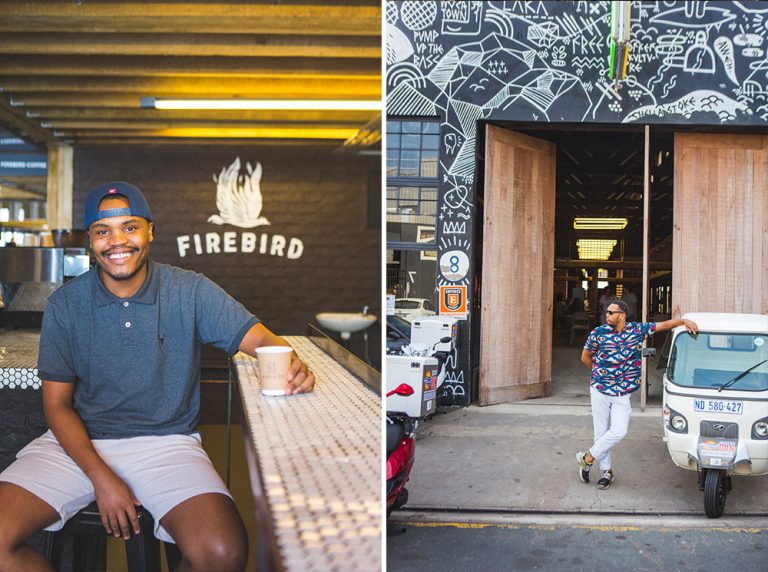
Trevor from Firebird Coffee; on the right, Reese Easthorpe, retail curator at 8 Morrison Street.
‘My parents never expected me to become a barista,’ Trevor says. ‘The concept of placing so much importance around coffee is foreign to them. But coffee means something different to me. It’s a time for people to sit down together and talk, like you and I are doing right now. It’s creating the space for connection. I love how coffee brings people together.’
I ask him about the urban regeneration Durban is going through, and the plans for Rivertown Triangle.
‘The city is changing,’ Trevor says. ‘But for me, the biggest area of development is going to happen in the townships. People see all these things happening in the city – the craft beers and lifestyle. Why should they have to get in a taxi and travel into the city to get it? Why can’t they get it right where they live, in the townships? I run a business selling gourmet burgers in KwaMashu. It was started by Vuyani Ndlovu and has only been open for a couple of months, but it does well – you should see the queues on the weekends! People appreciate having good food as an option right on their doorstep. It’s just the start.’
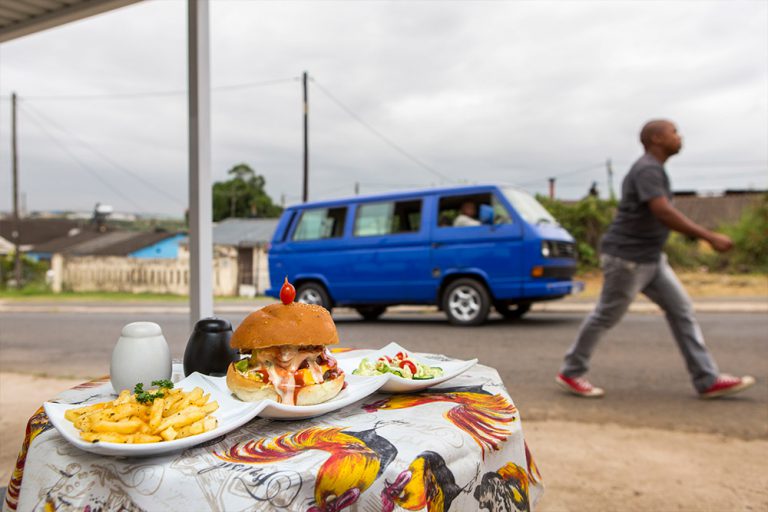
Ekasi Drive-Thru, serving gourmet food in Kwa-Mashu, is a must-visit.
There is a lot to do in Durban nowadays. The city is indeed changing, but at the slow, late-adopter pace that characterises it. We drove to the harbour that evening, picking our way slowly along the sandbar next to the yacht club to watch the city ease into night. We pulled to a stop between two cars and switched off the engine.
A whistling teenager came up to us and waved a bag of sand prawns in our direction. Next to us a father and his two children were fishing. Both children were young; the daughter was dressed in fluffy onesie pyjamas and the son was barely half the length of the fishing rod he was dangling determinedly into the shallows. His father talked quietly to him, showing him where Mecca was and explaining where the sun rises and sets. They put down the rods and walked back to the car, taking out a small rug and laying it on the ground. Kneeling, the father and son started praying, soft words merging with the sounds of lapping water.
The lights of the city flickered across the bay behind them. I was filled with spreading warmth, happy to witness to this quiet moment against the city’s backdrop.
There are many plans for Durban, with areas of rejuvenation and conventional ideas being challenged. It’s exciting to see where we go, and to hear the passion behind voices when there’s talk of the future. My old home is slower than Johannesburg and less pretty than Cape Town, but it’s authentic – a city of diverse people unwittingly sharing in each other’s lives.
This is the fabric of Durban, and that’ll be a constant no matter how it develops.
Plan your trip to Durban
Getting to Durban
Durban is about an hour’s flight from Joburg (R1400 return) and about a two hours from Cape Town (R1600 return), both with FlySafair. For those taking the road, it’s 560 kilometres from Johannesburg along the N3. That’s about six hours of driving time – and you’ll fork out R341 in toll fees along the way.
flysafair.co.za
Need to know
The weather is mild to hot throughout the seasons. If you want to learn to surf, there’s no better place to do so than in these warm waters. Durban’s all about keeping it casual – ditch the heels and fancy watch in favour of slops and a friendly greeting. Public transport is relatively limited, so its best to rent a car or use an Uber, and be mindful of petty theft throughout the city.
Things to do in Durban
Take a Street Scene tour. There are tours of varying lengths – I did the Super Scene full-day tour (R1 020 pp, discounts available for groups), which covers the Inanda Heritage Route and Durban city, including the Warwick Triangle area. The tour gives you an introduction to the culture and roots of our country’s history, much of which happened on Durban’s doorstep. It’s a must-do for visitors and Durbanites.
0313215079, streetscene.co.za
Go for an afternoon drink at Sidebar. This narrow bar neighbours the popular Spiga d’Oro and is an intimate space that encourages conversation with your neighbours. 0313039511, sidebar031.tumblr.com
Cycle along the promenade. It’s the best way to see the Durban beachfront. Tie it in with breakfast at The Bike & Bean or reggae sundowners at Wahooz. Hire a bike from The Bike & Bean from R40 per hour. 0827736870, bikebeandurban.com
Visit The Chairman, Durban’s hidden gem; red-carpet glam, jazz and a backdrop of derelict buildings – what could be better? Entrance is R150 per person. (Don’t panic – it automatically goes towards your bar tab.) 0783871408, thechairmanlive.com
Sample the local craft beer at S43. Super trendy with trestle tables and downlights that look like hops, it’s a chilled place to hang out with friends. 0313032747, thatbrewingco.co.za
Head to Station Drive for The Morning Trade market on a Sunday – it’s positively pumping. Wander through the shops at Station Drive Precinct, then head for food at The Plant or for gin and tonics up at Distillery 031, Durban’s first craft distillery. 0879414540, distillery031.com
Explore Ike’s Books and Collectables. This trove of historic, out-of-print books is fascinating to browse and is sure to quicken any collector’s pulse. 0313039214, ikesbooks.com
Visit 8 Morrison Street for streetwear, galleries and good coffee. Regular music events and markets are hosted – keep an eye on its website to stay up to date. 0624556067, 8ms.co.za
Where to stay in Durban
d’Urban Elephant is filled with items Howard Roberts and his late wife, Marleen, have collected over the years. The guests are just as interesting; with the university close by you will often find Russian cosmologists and research scientists around the breakfast table. From R650 per person sharing B&B. 0827722008, durbanelephant.co.za
The Concierge Boutique Bungalows is just off Florida Road, in a quiet courtyard. The quirky decor is fun and modern. From R595 pp sharing. 0313094434, the-concierge.co.za
Mythai Guest House has a leafy garden and abundance of water inspired by the owner’s frequent travels to Thailand. From R420 pp sharing B&B. 0313032035, mythaiguesthouse.com
Where to eat in Durban
Habesha Cafe offers Ethiopian and Eritrean cuisine. We loved their tibs (beef with rosemary, berbere and kibe) served with injera (traditional flatbread) for R65. Bring friends and share dishes. 0760462516, find them on Facebook.
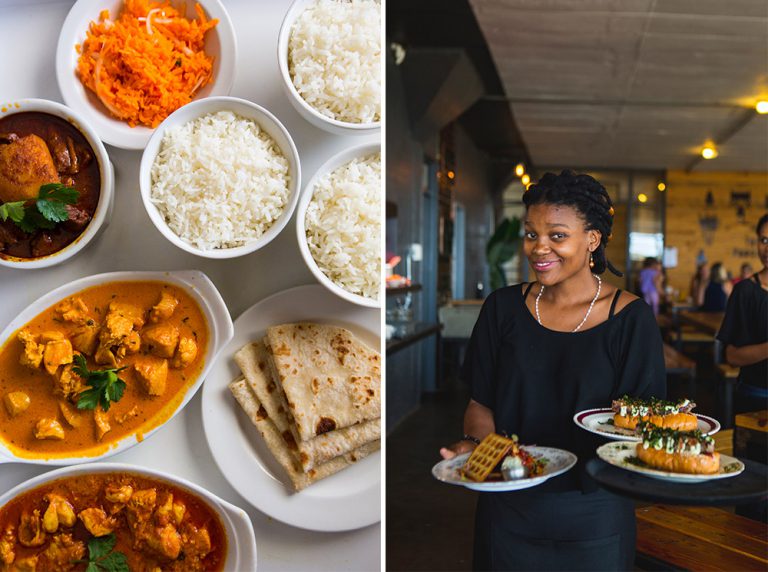
On the left, Britannia Hotel’s curries are famous; on the right, Distillery 031 serves lunch as well as a selection of artisan spirits.
eKasi Drive-Thru in KwaMashu is a neat, white shipping container serving unpretentious, damn good and plentiful food. Choose the chicken wings for R20 or the saucy burger (including chips and salad) for R55. 0785275137, find them on Facebook.
Britannia Hotel, a well-established favourite among Durbanites, is in an old Victorian building and is the place to go for curries. I had my usual – the butter chicken curry for R69. 0313032266, hotelbrits.co.za
This story first appeared in the July 2016 issue of Getaway magazine.
Our July issue is packed full of great winter holiday ideas. On shelves from 20 June.

You may also like

